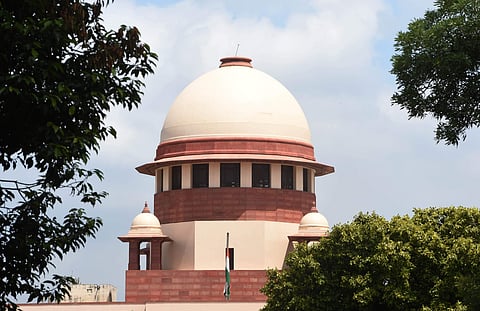

The All India Students' Association (AISA) has issued a statement calling for the Supreme Court to revisit its verdict on the 103rd Constitutional Amendment that granted reservation to the Economically Weaker Section (EWS) category in government jobs and in educational institutions.
A five-judge Constitutional Bench of the Supreme Court approved the amendment in a 3:2 majority verdict yesterday, November 7. AISA, in its statement, raised objections on the validity of the EWS reservation, which includes individuals whose annual family income is less than Rs 8 lakh, who own less than five acres of agricultural land and who do not belong to the Scheduled Caste, Scheduled Tribe or the Other Backward Classes. This exclusion of people from the SC, ST and OBC categories was questioned by AISA in its statement. "If the Modi government is really committed to uplifting the Economically Weaker Sections, why are they depriving the Dalits/Adivasis and OBCs by denying them EWS quota? Do they believe that there is no poverty among these social groups? It is academically proved that poverty is more concentrated among the Dalits, Adivasis and OBCs. Then why this denial?" read the statement.
AISA's statement also pointed out that the first time a reservation on the basis of economic levels and poverty was introduced in 1991, a nine-judge Bench of the Supreme Court at the time struck it down, stating that poverty alone cannot be the measure of backwardness and that social and educational deprivation was the major reason behind the idea of reservation. Chief Justice of India UU Lalit and Justice Ravindra Bhat observed that the reservation for the EWS category, while in itself not violative, "strikes at the heart of the equality code". "By excluding the poor among SC/ST/OBC from economically backward classes, the amendment practices constitutionally prohibited forms of discrimination," noted Justice Bhat.
AISA also stated that the EWS quota breaches the 50% limit on reservations. The statement noted that when requests to increase reservation for SC, ST and OBC categories were put in, the 50% limit was cited to reject that demand. "The EWS reservation flouts that 50% ceiling. But to our astonishment, we find that the criterion of the constitutional ceiling was comfortably ignored to make way for this EWS reservation." Justice Bhat in his judgement remarked that breaching the 50% limit would lead to further compartmentalisations in reservation.
The petitions filed against the 103rd Amendment, which was effected in January 2019, challenged the constitutional validity of the amendment. The amendment was introduced as clause (6) in Article 15 of the Constitution. It allowed for reservation for the EWS category in all government, private, aided and unaided institutions (barring minority institutions). The upper limit for the reservation was set at 10%, and this would be in addition to the existing reservation.
